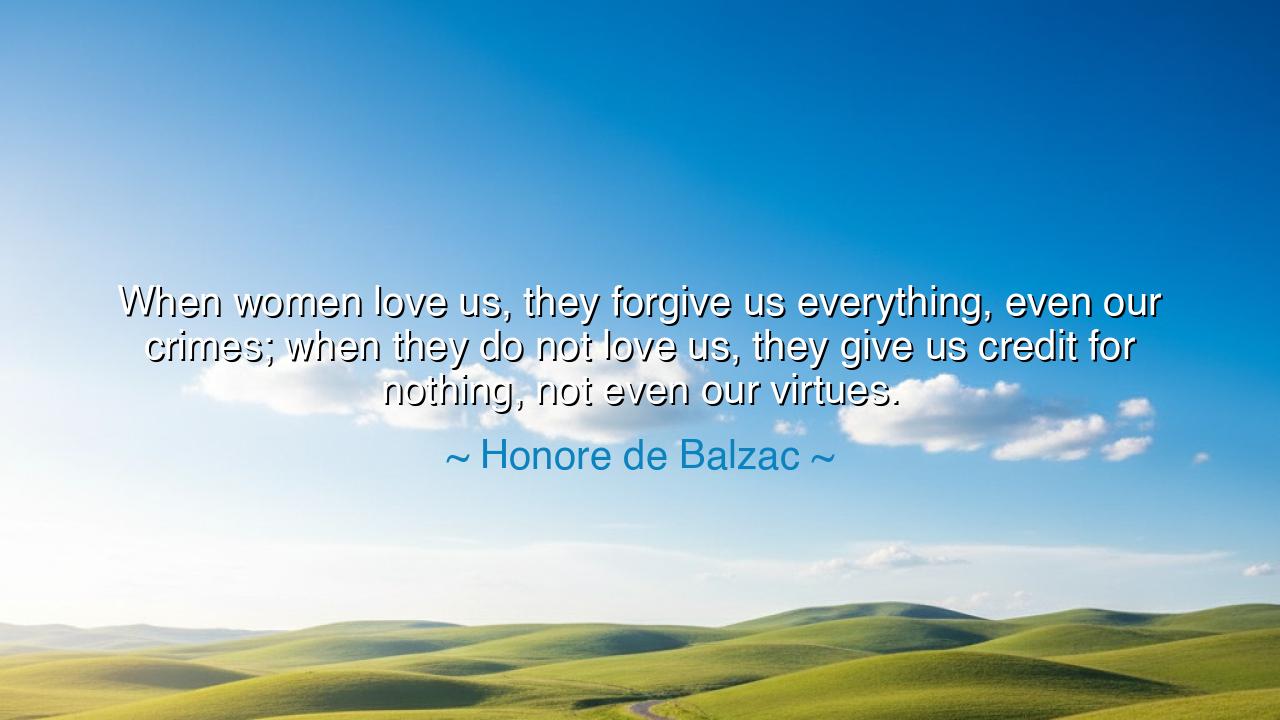
When women love us, they forgive us everything, even our crimes;
When women love us, they forgive us everything, even our crimes; when they do not love us, they give us credit for nothing, not even our virtues.






When Honoré de Balzac wrote, “When women love us, they forgive us everything, even our crimes; when they do not love us, they give us credit for nothing, not even our virtues,” he was not merely speaking of the passions between man and woman, but of the deeper law of human affection — that love transforms judgment, and that emotion, once awakened, alters the way we perceive all things. Within these words lies both tenderness and tragedy. Balzac, the great observer of human nature, knew that love blinds not because it is foolish, but because it is generous; it sees through the heart, not the eyes. And conversely, when love dies, the light of understanding goes out, and even the noblest actions seem darkened by suspicion.
In this saying, Balzac reveals one of the most ancient truths of the human soul: that affection shapes perception. To be loved is to be seen with mercy; to be unloved is to stand before a harsh and unyielding mirror. The ancients understood this well. Sophocles wrote that “to be loved gives grace even to the ungraceful,” while the Stoics warned that hatred distorts judgment. Love softens the edges of another’s faults; indifference magnifies them. Thus, Balzac’s insight is not only about women or romance, but about the nature of emotional truth — that our hearts, not our logic, determine how we interpret others.
In Balzac’s world — nineteenth-century France, a society of salons and passions — women were both the emotional center and the moral conscience of relationships. When he says, “When women love us, they forgive us everything,” he pays tribute to their capacity for devotion and forgiveness, qualities that flow from the well of maternal and romantic love alike. For a woman in love, the beloved becomes a sacred image, and even his flaws are absorbed into her affection. Like Desdemona loving Othello even as he wrongs her, or Juliet loving Romeo beyond his sins, the heart that loves sees not a sinner, but a soul. Such love is not blind — it is faithful, and faith is the highest form of sight.
But the second half of Balzac’s quote cuts like a blade: “When they do not love us, they give us credit for nothing, not even our virtues.” Here he speaks of the reverse power of emotion — how rejection transforms perception into cruelty. Once affection is gone, the heart turns cold, and even goodness appears deceitful. This is the other face of human nature: love idealizes, but absence of love condemns. The same man who once seemed noble now appears vain; what was once passion becomes selfishness; what was once courage becomes arrogance. The person has not changed — only the heart that beholds them has. And thus, love and hate are two mirrors reflecting the same face in different lights.
History offers many examples of this transformation. Consider Napoleon Bonaparte, adored in his rise, despised in his fall. While France loved him, even his wars were called glorious; when that love turned to weariness, his very genius was branded tyranny. So too in personal life — when love reigns, even faults are forgiven as signs of humanity; when it fades, virtues are forgotten, as if they never existed. Balzac, ever the realist, saw that the world judges not by justice, but by affection. He knew that the heart, once closed, can make saints seem sinners, and sinners seem saints.
Yet within this melancholy truth lies a profound lesson. We must not base our peace upon the shifting winds of another’s love. For to live by the approval of others is to be enslaved to their emotions. Instead, we must anchor our worth in the constancy of character, not in the fleeting grace of affection. Love may exalt you today and abandon you tomorrow; praise may turn to scorn in a moment. But virtue, once grounded in truth, remains untouched by favor or rejection. The wise soul acts not to be loved, but to be just and whole, whether adored or despised.
So, my child of the future, remember this teaching: love is a sacred fire, but it is not a stable one. It burns bright and blinds, then flickers and fades. Do not curse it for its impermanence, nor trust it as your only light. Accept its warmth with gratitude, but keep the lamp of your own integrity burning within. For when love forgives your crimes, be humble; and when love denies your virtues, be steadfast. The heart of others may sway like the tide — but your truth must stand like the shore.
Thus spoke Balzac, with the wisdom of a man who had known both adoration and exile: Love may absolve or condemn, but character endures beyond both.






AAdministratorAdministrator
Welcome, honored guests. Please leave a comment, we will respond soon